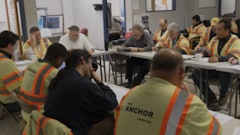The National Institute of Standards and Technology (NIST) has published a Roadmapping Workshop Report that suggests ways to facilitate wider adoption of composites in a variety of infrastructure applications, including dams, bridges, highways, railroads, harbors and waterfront structures, utility poles and buildings. Composites can help project owners and end users save construction costs and create a durable, sustainable 21st century infrastructure that supports economic growth.
The NIST report summarizes ideas gleaned from a February 2017 workshop facilitated by the American Composites Manufacturers Association (ACMA), the leading trade association representing the North American composites industry. One of the ways ACMA advocates for the interests of the composites community is by working with policymakers, regulators and federal agencies to foster policies and standards that grow the industry.
"As a leader in composites industry advocacy and standards development, ACMA was proud to support the development of this important project," said Tom Dobbins. "Last year's workshop helped us better understand the needs of infrastructure stakeholders, and the roadmap was developed with their feedback in mind."
During the workshop, designers, engineers, ACMA member manufacturers, researchers, owners and end-users identified barriers that must be overcome to enable the adoption of composite technology. The attendees developed a preliminary roadmap with three proposed solutions to those barriers. If carried out, they could lead to the adoption of Fiber Reinforced Polymers (FRPs) that are more reliable, durable and cost-effective than current infrastructure material options. The proposals included:
- Improved durability testing: The development of a five-year program to establish reliable design tools based on new durability standards. The tools would be available to all stakeholders through an online data portal.
- Design Data Clearinghouse: A desire for a way to gather, curate and disseminate design data to engineers.
- Education and Training: The need to create a constant stream of education and training materials for universities and industrial schools that have composite training and certification programs.
"I look forward to the execution phase of this roadmap, during which the industry will see the results of the effort in terms of greater market acceptance and sales volume growth," said Dustin Troutman, Director of Marketing and Product Development at Creative Pultrusions, Inc., who attended the workshop and contributed to the roadmap. "The U.S. taxpayer will be the real winner as we use composite materials in conjunction with legacy materials of construction to begin rebuilding our critical infrastructure."
"We look forward to working with the composites industry, other government agencies and university partners to address the needs identified by the workshop participants," stated Jeffrey Gilman, leader of the composites project at NIST.
The Roadmapping Workshop Report is available free of charge at: https://doi.org/10.6028/NIST.SP.1218
















![Fcp Racatac Chair 10893876[1]](https://img.forconstructionpros.com/mindful/acbm/workspaces/default/uploads/2025/10/fcp-racatac-chair-108938761.10l0At5WXv.png?ar=16%3A9&auto=format%2Ccompress&bg=fff&fill-color=fff&fit=fill&h=135&q=70&w=240)


